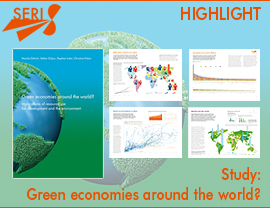SERI Highlights Archive
SERI Highlights focus on special issues in our field of activities. The SERI Highlights are an important part of the SERI Infomail. Here you can find the past editions.
Highlight 03/2012: Sustainability in urban planning, construction and living
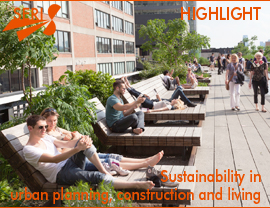 The construction of cities and infrastructure influences the planet’s ecology to a great extent. From a global perspective, especially during the last decades more and more resources have been withdrawn from the earth for the construction of buildings and cities – resources which are finite and their shortage is reflected in rising prices. This results in serious environmental impacts.Read more
The construction of cities and infrastructure influences the planet’s ecology to a great extent. From a global perspective, especially during the last decades more and more resources have been withdrawn from the earth for the construction of buildings and cities – resources which are finite and their shortage is reflected in rising prices. This results in serious environmental impacts.Read more
Highlight 02/12: Eco-Innovation
 Strengthening and expanding eco-innovations is a key requirement to transform Europe into a resource-efficient and sustainable region. SERI analyses the eco-innovation performance in European countries and develops options how eco-innovations can support the required systemic transition of our societies.Read more
Strengthening and expanding eco-innovations is a key requirement to transform Europe into a resource-efficient and sustainable region. SERI analyses the eco-innovation performance in European countries and develops options how eco-innovations can support the required systemic transition of our societies.Read more
Highlight 01/12: Resource efficiency in developing and emerging countries
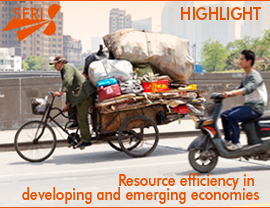 SERI´s research group Sustainable Resource Use investigates the use of natural resources on which our societies are built. Some of the central concerns in this field include differences in extraction, consumption, trade and efficiency across different countries and world regions. Read more
SERI´s research group Sustainable Resource Use investigates the use of natural resources on which our societies are built. Some of the central concerns in this field include differences in extraction, consumption, trade and efficiency across different countries and world regions. Read more
Highlight 05/11: Ecosystems at our service - how can we benefit in a sustainable way?
 SERI´s research group “Quality of Life and Integrated Strategies” investigates how we can achieve a good life for ourselves and future generations. This implies that we have to take care of the ecosystems we depend on and use their resources in a sustainable way. This highlight aims to show how we – as human beings with individual knowledge, skills, networks and relationships– make decisions on how to benefit from ecosystems. Read more
SERI´s research group “Quality of Life and Integrated Strategies” investigates how we can achieve a good life for ourselves and future generations. This implies that we have to take care of the ecosystems we depend on and use their resources in a sustainable way. This highlight aims to show how we – as human beings with individual knowledge, skills, networks and relationships– make decisions on how to benefit from ecosystems. Read more
Highlight 04/11: Communicating the Idea
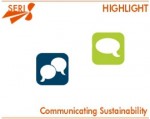 Sustainable development is increasingly dependent on ideas rather than information. This means that empirical data is often not enough on our way to a sustainable society. Year after year, scientific research creates thousands of pages of environmental data supporting the assumption that our current western lifestyles have reached a level of resource and energy consumption that is far too high for the planet earth to sustain in the long run. But what’s the use of this vast heap of information if there is hardly anyone taking interest in it, let alone who really understands it? Read more
Sustainable development is increasingly dependent on ideas rather than information. This means that empirical data is often not enough on our way to a sustainable society. Year after year, scientific research creates thousands of pages of environmental data supporting the assumption that our current western lifestyles have reached a level of resource and energy consumption that is far too high for the planet earth to sustain in the long run. But what’s the use of this vast heap of information if there is hardly anyone taking interest in it, let alone who really understands it? Read more
Highlight 03/11: Colouring Growth in a Sustainable World
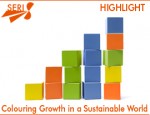 Economic growth has come under fierce criticism in recent years because it has led to substantial environmental problems: renewable resources are not renewed, non-renewable resources are being depleted, and global ecosystem processes are disrupted. Through its effects on nature, society and the moral values underpinning it, as well as on the realm of politics, this destructive type of Brown Growth has had strong effects on human wellbeing. It was primarily driven by innovation and increases in labour and capital productivity, two processes which have largely failed to promote resource productivity and to reduce the environmental impacts of growth (absolute decoupling). Read more
Economic growth has come under fierce criticism in recent years because it has led to substantial environmental problems: renewable resources are not renewed, non-renewable resources are being depleted, and global ecosystem processes are disrupted. Through its effects on nature, society and the moral values underpinning it, as well as on the realm of politics, this destructive type of Brown Growth has had strong effects on human wellbeing. It was primarily driven by innovation and increases in labour and capital productivity, two processes which have largely failed to promote resource productivity and to reduce the environmental impacts of growth (absolute decoupling). Read more
Highlight 02/11: Sustainable consumption and production: vision or realistic option?
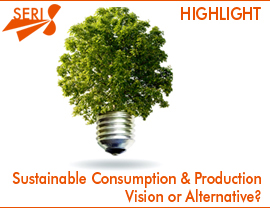 SERI’s research group “Sustainable Consumption and Production” applies various methods within its projects. The most common ones are analyses at the product and company level using quantitative sustainability indicators. On the basis of environmental indicator assessments as well as on qualitative aspects, the SCP group conducts strategic consulting for companies, CSOs and policy makers that wish to reduce their resource use and ecological impacts of production and consumption. The SCP group focuses on analyses related to agriculture and nutrition, forestry and renewable resources, traffic and mobility, construction and living, as well as IT and communication services. Read more
SERI’s research group “Sustainable Consumption and Production” applies various methods within its projects. The most common ones are analyses at the product and company level using quantitative sustainability indicators. On the basis of environmental indicator assessments as well as on qualitative aspects, the SCP group conducts strategic consulting for companies, CSOs and policy makers that wish to reduce their resource use and ecological impacts of production and consumption. The SCP group focuses on analyses related to agriculture and nutrition, forestry and renewable resources, traffic and mobility, construction and living, as well as IT and communication services. Read more
Highlight 01/11: Resource efficiency
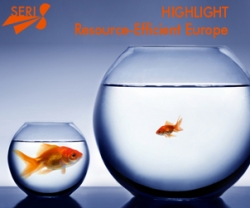 The European Union is currently working on “Europe 2020” – a growth strategy for a resource efficient future. SERI is involved in 4 projects within the “Resource-efficient Europe” flagship initiative. The SERI-projects will deliver important inputs for the “Resource-Efficiency-Roadmap” for the EU member states and will use the chance of directly influencing political processes. Read more
The European Union is currently working on “Europe 2020” – a growth strategy for a resource efficient future. SERI is involved in 4 projects within the “Resource-efficient Europe” flagship initiative. The SERI-projects will deliver important inputs for the “Resource-Efficiency-Roadmap” for the EU member states and will use the chance of directly influencing political processes. Read more
Highlight 05/10: High Quality of Life and Less Resource Consumption: is that possible?
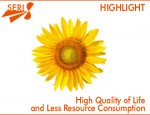 It is known that climate change induces pressure on natural systems and many ecosystems face immense challenges. The SERI-Highlight „2010 – The international year of Biodiversity“ has discussed the importance of ecosystems in this context. Not only natural systems, but also social systems are affected by climate change on various levels: Environmental change might lead to forced migration, as certain regions are not able to provide for the livelihoods of their population. Climate change has already led to huge economic costs due to damages caused by extreme weather events as well as necessary adaptation measures like the building of dams or the provision of early warning systems.
It is known that climate change induces pressure on natural systems and many ecosystems face immense challenges. The SERI-Highlight „2010 – The international year of Biodiversity“ has discussed the importance of ecosystems in this context. Not only natural systems, but also social systems are affected by climate change on various levels: Environmental change might lead to forced migration, as certain regions are not able to provide for the livelihoods of their population. Climate change has already led to huge economic costs due to damages caused by extreme weather events as well as necessary adaptation measures like the building of dams or the provision of early warning systems.
All mentioned examples might still fall into the category “That is not good, but it doesn´t really affect me” But there are numerous examples that (could) affect our daily lives: What do we eat, if the basic components of our nutrition do not grow anymore? What happens if there is no snow in winter? Yes, we would not be able to go skiing any longer, but what are the consequences for economy and tourism? What happens to the people depending on winter tourism? Asking those questions makes the topic climate change more graspable. You realize that you are part of the bigger picture and that you personally have to deal with the consequences of climate change. Read more
Highlight 04/10: 2010 – The international year of Biodiversity
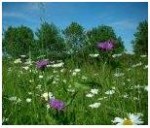 The United Nations declared 2010 to be the International Year of Biodiversity and invited the world to take action in 2010 to safeguard the variety of life on earth. Thus, we provide a collection of information worth knowing about biodiversity. Other than that we introduce some SERI projects and publications which deal with biodiversity and list links related to current debates on this topic. Read more
The United Nations declared 2010 to be the International Year of Biodiversity and invited the world to take action in 2010 to safeguard the variety of life on earth. Thus, we provide a collection of information worth knowing about biodiversity. Other than that we introduce some SERI projects and publications which deal with biodiversity and list links related to current debates on this topic. Read more
Highlight 03/10: How do we reach our climate goals?
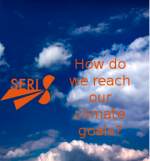 Can Austria reach current energy and climate goals by 2020? The research institute SERI along with its partners tried to figure out answers to this question in the e-co project by order of the “Klima- und Energiefonds (Climate and Energy Fund)”. On the one hand, they examined how necessary changes in Austrian energy consumption could look like and on the other hand they analyzed the resulting effects on the economy. Therefore, different scenarios with diverse foci were developed, such as expansion of renewable energy, increase in efficiency and reduction of consumption through behavioral change. Results are disillusioning. Only one of the scenarios achieves the target of a 34% renewable energy share of final energy consumption by 2020. Not a single scenario provides a decrease in CO2-emissions below the level of 1990 (62,08m tons CO2) – the Kyoto emission target for Austria would be 13% below the level of 1990. However, the transition towards sustainable forms of energy use has a positive effect on the GDP as well as on employment rates. Read more
Can Austria reach current energy and climate goals by 2020? The research institute SERI along with its partners tried to figure out answers to this question in the e-co project by order of the “Klima- und Energiefonds (Climate and Energy Fund)”. On the one hand, they examined how necessary changes in Austrian energy consumption could look like and on the other hand they analyzed the resulting effects on the economy. Therefore, different scenarios with diverse foci were developed, such as expansion of renewable energy, increase in efficiency and reduction of consumption through behavioral change. Results are disillusioning. Only one of the scenarios achieves the target of a 34% renewable energy share of final energy consumption by 2020. Not a single scenario provides a decrease in CO2-emissions below the level of 1990 (62,08m tons CO2) – the Kyoto emission target for Austria would be 13% below the level of 1990. However, the transition towards sustainable forms of energy use has a positive effect on the GDP as well as on employment rates. Read more
Highlight 02/10: How much (too much!) water do we consume?
Water is playing a significant role on our planet. From an anthropogenic point of view, water is of great importance not only for direct consumption like supply of drinking water, food production and the production of energy and other products. Water is also essential for our ecosystems and the services these systems provide to human beings (climate, leisure time, etc).
SERI works on the quantification and visualisation of the world-wide correlations between resource use of diverse players, transport, which results of the linkages of global trade, and associated impacts on the environment and the local as well as the global social system and the economy. The focus lies on analysing the effects of the western lifestyle in Europe on the living conditions and the possibilities of development of people in other parts of the world. Read more


